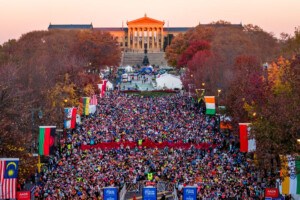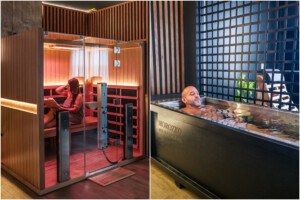For His 30th Birthday, This Leukemia Survivor Went on a Road Trip to Share His Story in 30 Cities
Brewerytown resident Vincent Goodwin — a November Project fanatic, a blood-cancer.com moderator, and an aspiring podcaster — has used his cancer journey to stoke conversation and connection.
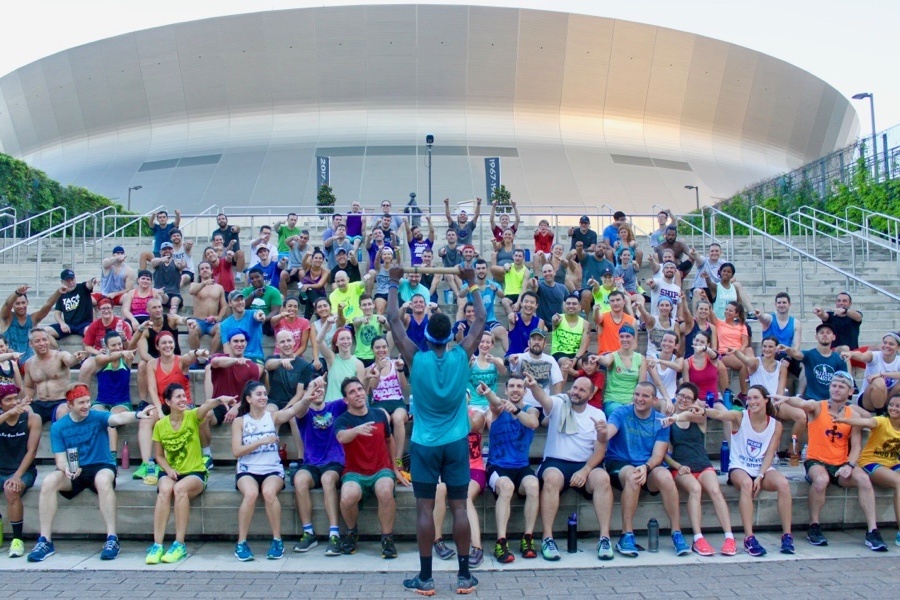
Fifteen years after he was diagnosed with acute myeloid leukemia at age 15, Vincent Goodwin went on a celebratory road trip to share his story in 30 different cities. / Photograph courtesy of Vincent Goodwin
Who I am: Vincent Goodwin
What I do: I’m an advocate and moderator for Health Union and a mentor for Children’s Hospital of Philadelphia.
***
“I was 15 and going into my junior year of high school when I was diagnosed with leukemia. The summer before, I helped out one of the head janitors at one of our local elementary schools doing heavy work — mopping, moving tables, etc. Once the school year started approaching, it was time to go to soccer camp. (I played soccer and baseball as an athlete in high school.) I realized I was oddly out of shape. I couldn’t even run a lap around the soccer field. And I was experiencing extreme fatigue and night sweats and hot flashes for two weeks. It was awful. I knew something was wrong. I just didn’t know what.
My mother was actually dealing with her own health issues, and she was in the hospital for two weeks. Once she got released, we went food shopping, and I was tasked with carrying the groceries into the house. For me, that was normally a pretty simple task, but I couldn’t even walk up one stair in our condominium with one bag of groceries. She told me, ‘If you can’t do this, I’m going to take you to the hospital.’
I grew up in Cheltenham [Township], so we went to Abington Hospital, and they did some blood tests. That was the first time I saw my stepdad cry. I was later told that my hemoglobin level was below a critical level. If you’re not familiar, hemoglobin is the amount of oxygen in your bloodstream that your cells are able to carry. So basically, I was anemic — walking around school and playing soccer with my heart trying to pump oxygen to the rest of my body but overworking to do it.
I immediately got rushed to Children’s Hospital of Pennsylvania (CHOP). I was in in the intensive care unit for a night. That’s where I was diagnosed with acute myeloid leukemia, acute meaning the onset is much quicker, which is why I went from having this really heavy-duty job to not being able to pick up a bag of groceries.
I went through eight months of chemotherapy — three rounds. Each time wielded its own set of symptoms. My first round of chemotherapy, my hair fell out. I also got infections ‘cuz my immune system was just starting to be weakened, and so I got things like an abscess underneath my arm. Because it hurt to lift my arm because of the abscess, I held my shoulder in one place for a long period of time, and my entire shoulder ended up tightening up and I couldn’t move it, so I had to do physical therapy just to get my range of motion back.
I lost probably around 40 to 50 pounds, and it was really challenging to look at myself in the mirror. I looked kind of like skin and bones. Imagine being an athlete and feeling like you just kind of lost all that muscle you worked hard for, especially as a high school kid.
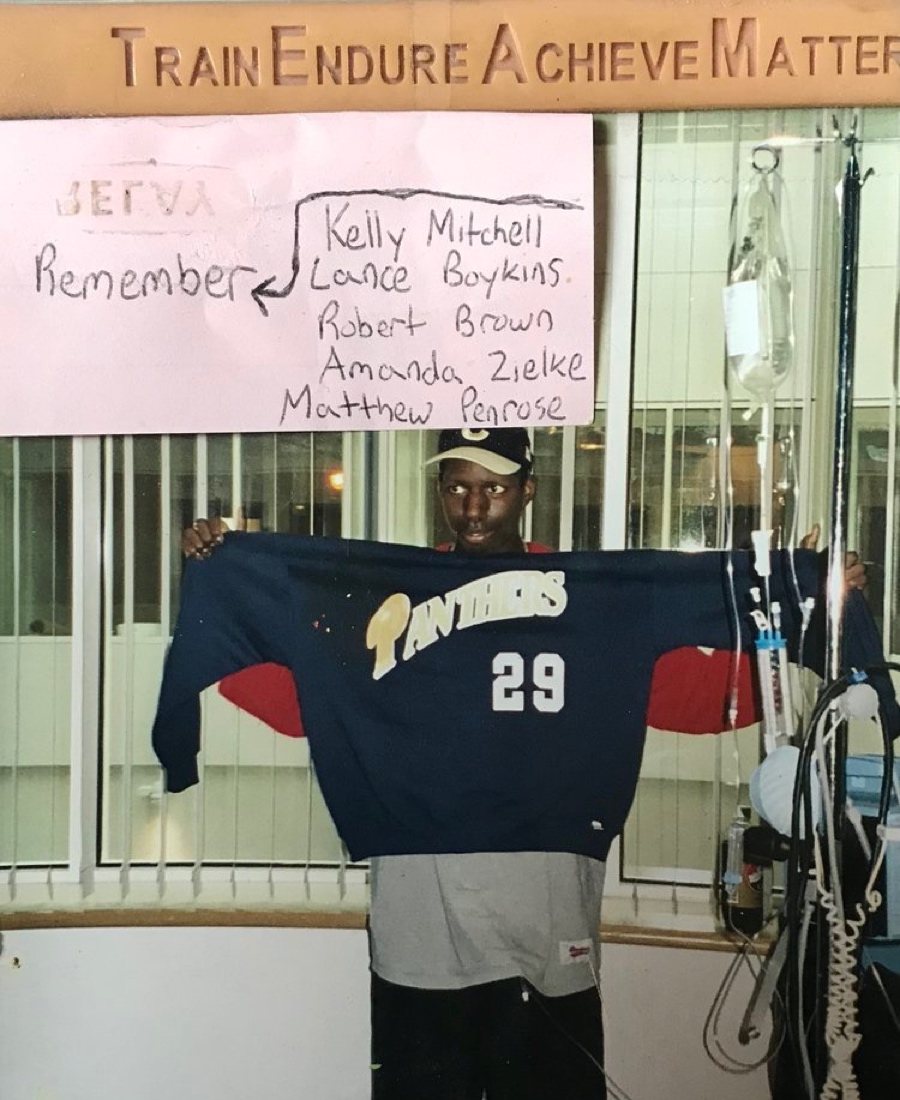
Goodwin during leukemia treatment with a sign bearing the names of children he knew who passed away from cancer. / Photograph courtesy of Vincent Goodwin
My second round of chemotherapy brought about some different challenges. I remember experiencing uncontrollable tremors. It almost felt like an earthquake was occurring inside of my body. It happened sporadically throughout each day. Even in the middle of the night sometimes, I’d just be sweating because it was so violent.
Another side effect I experienced was nausea and regular vomiting. I literally could not hold anything down. It got to the point where I was drinking, I kid you not, canned orange Gatorade. Unfortunately, this part of my treatment happened during Thanksgiving. My cousins came to visit me, and they made me a huge plate of Thanksgiving food — stuffing, ham, and, my favorite, deviled eggs. I remember those deviled eggs so well because I looked at this plate of food, and I knew I shouldn’t touch any of it. But I decided to eat one deviled egg.
About 45 minutes to an hour after they left, I remember unplugging my IV pole and walking to the bathroom, which was only 10 feet away, and not even halfway to the bathroom, not only did I vomit a lot, but I also had uncontrollable diarrhea all down my leg in the middle of my room. It’s shocking to experience lack of control over bodily functions like that as a teenager. It felt like I was violated in that moment.
Fortunately, I had really great nurses that were very kind and understanding and made me feel at home. In that moment, it’s hard to not feel like you’re a burden and to not feel like you’re making someone else’s life miserable. But the nurses that came in — not only did they make sure I was physically OK, but they also made sure I was mentally and emotionally OK, that I didn’t take on any of that emotional burden of them having to tend to me and take care of me because they were happy to do it. They were very supportive, and I think that went a long way in really helping to develop and boost my self-confidence.
I think I was always the kind of person who was confident in myself, but I wasn’t confident in front of other people. So, when I was first diagnosed and I was in the hospital, one of the first thoughts I had was no one’s going to notice that I’m gone. That’s a terrible thing to think. But it was kind of cool because I ended up getting a lot of social support from teachers and people that I didn’t expect. I got cards. I got visits. I got gifts. People bought me PlayStation 2 games to play. It was nice to have that outpouring of support.
When I came back to school, it was a little bit of a challenge. I remember going to my school’s Halloween dance and Nelly’s “Hot in Herre” coming on. I love to dance, and I really get into it, so I was like, ‘Yeah, take off all your clothes,’ and I was trying to take my shirt off. Then I remembered I had a port in, and the line was hanging down. I was like, ‘Ooh, I can’t take my shirt off. That’s probably not sanitary, and that’s not sexy at all.’ It was just a reminder that there was another thing I would normally do in that authentic moment that I couldn’t do.
But I did get to play baseball that year, and I didn’t have to go through conditioning week, which was great. The following year for football, I did go through conditioning. Every day of ‘Hell Week,’ we had different fitness objectives. On Thursday, we did a practice timed mile, and then on Friday, we did a timed mile. In sophomore year, my best mile time was five minutes and 59 seconds. I’d already been going through that year being like, ‘How am I going to regain my fitness back?’
So I remember on Thursday doing the practice mile, and I finished with a time of seven minutes and 30 seconds. I was devastated. I was so crushed. I cried. ‘Cuz it just confirmed my fear that my fitness and my physical abilities had been taken away from me and all that hard work I’d done up to that point to get that 5:59 was gone.
So I went home, cried about it, had a moment. I came back the next day, I channeled all that emotion, and I ended up running a 5:56. I still cried. Because in that moment, it just felt like, ‘OK, you didn’t really lose what you thought you had lost. Maybe you just had forgotten what it was like to put in that kind of work and emotion and energy and that kind of focus.’ It felt like I had reclaimed something.
Fast forward to me approaching my 30th birthday. This was a loaded birthday for a couple different reasons, one because it was a shared experience — most people get excited to some degree about turning 30. But also for me, having looked back on being 15 and being in a place where my health was in a critical condition, just the thought of having made it through another 15 years after that, I thought that was worth celebrating.
I’d also recently joined a running community called the November Project. It’s a free fitness workout group that meets on Wednesdays at 6:25 a.m. on the Art Museum steps and Fridays at different locations around the city. We have this peer-to-peer award called the Hard Hat that gets passed around from person to person within the group to acknowledge and celebrate things.
The week my friend Sierra got it was actually her cancerversary. Unbeknownst to me, she was also a cancer survivor, diagnosed with lymphoma as a young adult. It opened up a door for me to actually speak to someone who had gone through a similar experience, and that was something I hadn’t really experienced much of. ‘Cuz once I went off to college, my plan had been, ‘Don’t talk about it. Only share it with who you trust.’ So I learned to not be defined by it, but also by doing that, trapped within me was this guilt I wasn’t able to release because I wasn’t talking about it. I saw how much of a positive effect sharing my story could have in creating connection but then also finding clarity within myself and putting myself on a journey of self-care and growth.
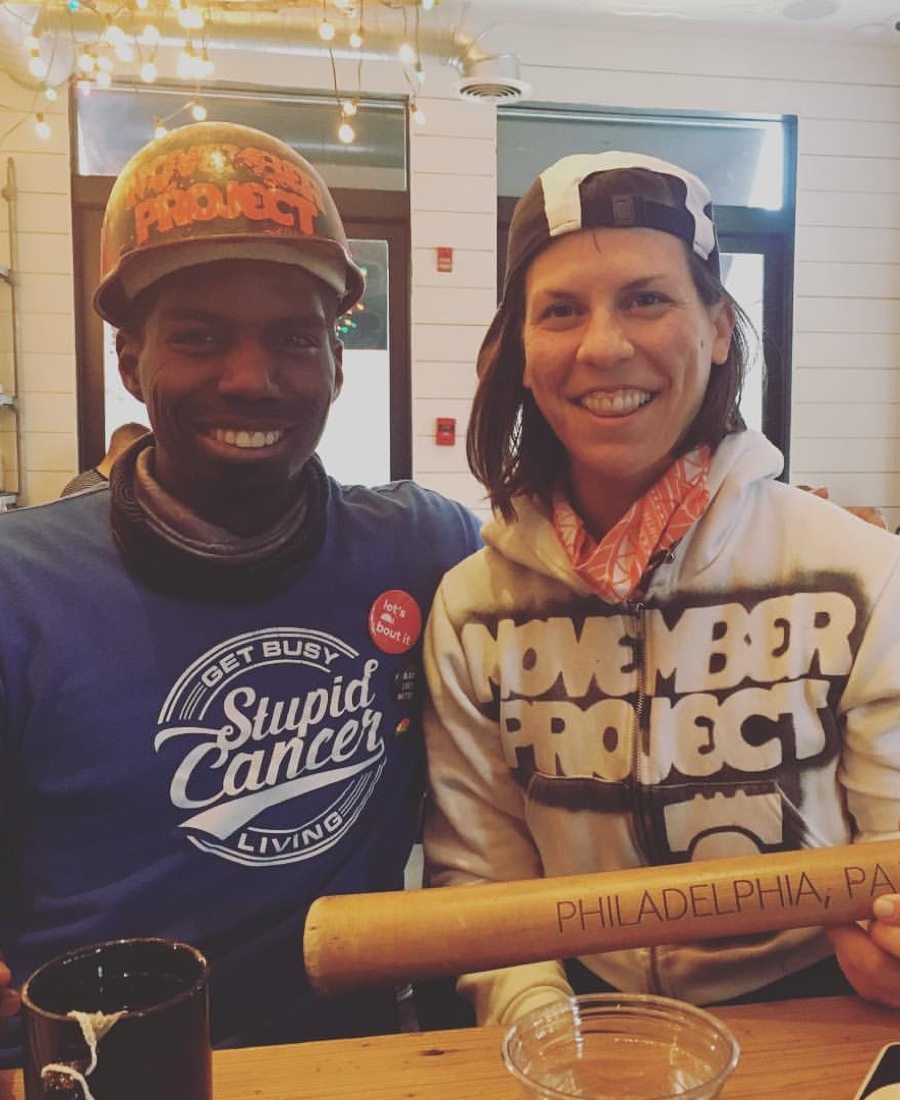
Goodwin with his friend, Sierra, a fellow cancer survivor who motivated him to share his story more publicly. / Photograph courtesy of Vincent Goodwin
So when I turned 30, not only was it a celebration of all these extra years of life I’ve gotten to experience, I also really wanted to lean into talking about it openly and proudly with a lot of people in the November Project community — because it was such a big part of me finding quality connections that aided me a lot in my personal growth. The November Project has groups in 52 cities around the world, so I hit 30 of them around the U.S. and Canada and stayed with someone from the November Project group in every city.
I thought Edmonton was really unique — it reminded me a lot of home in a way in terms of the group. The Philadelphia November Project group is very social, and we’re big, and Edmonton was actually one of the first three cities established as a November Project group, so they’re very big and welcoming. I also resonated a lot with ‘city cities,’ like Chicago and Seattle. I love Baltimore. I love Boston. I think that’s mostly because they reminded me of Philadelphia in terms of the lifestyle.
My biggest takeaway from the trip was how important it is to remember that you are never really alone and that self-love requires acceptance of yourself first. Only then can others begin to truly love, acknowledge, embrace, and celebrate your story for what it is.
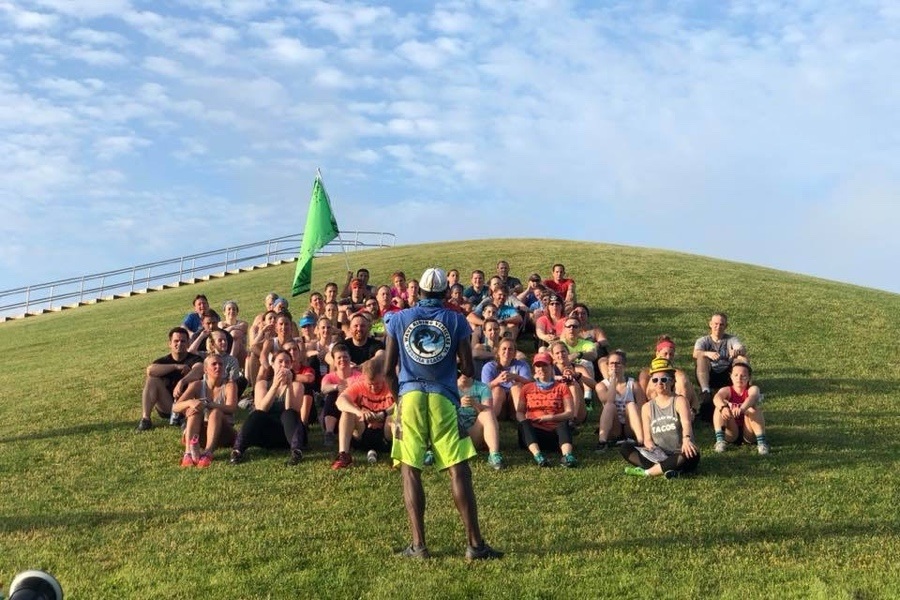
Goodwin telling his story to the November Project group in Virginia Beach. / Photograph courtesy of Vincent Goodwin
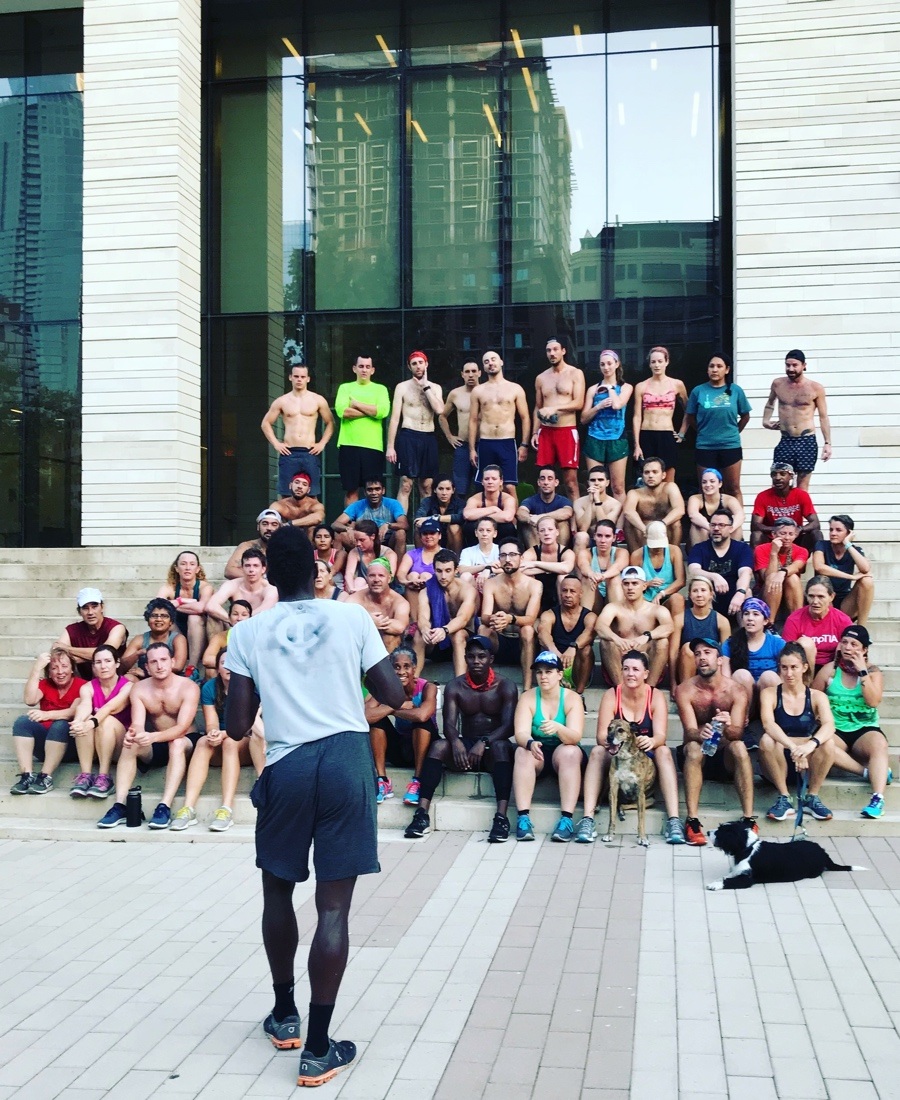
Goodwin with November Project Austin. / Photograph courtesy of Vincent Goodwin
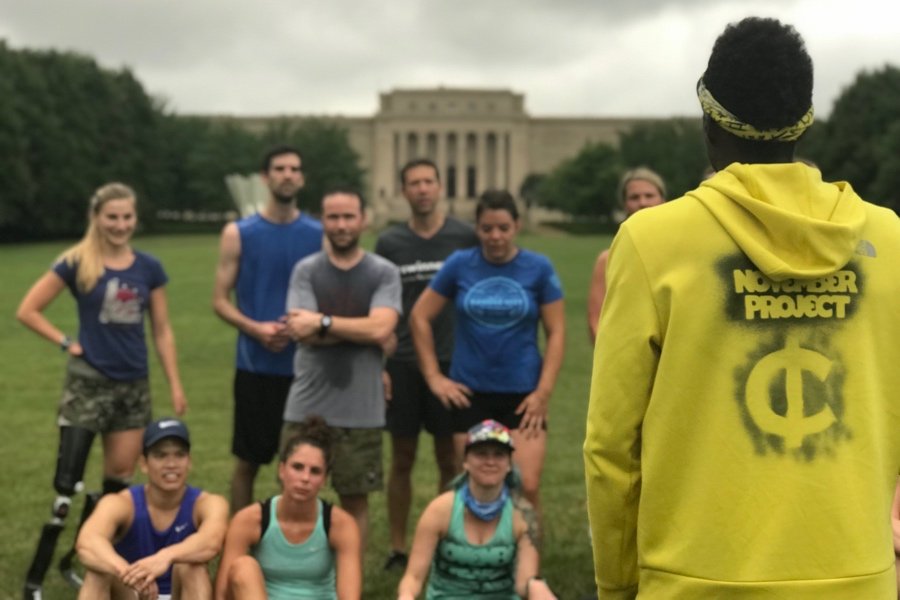
Goodwin with the November Project group in Kansas City. / Photograph courtesy of Vincent Goodwin
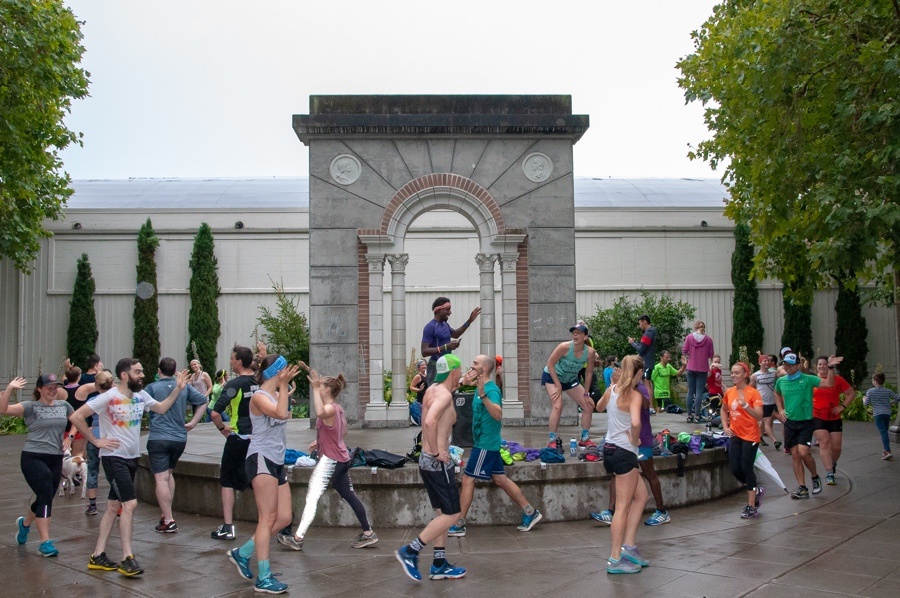
Goodwin leading the November Project workout in Seattle. / Photograph courtesy of Vincent Goodwin
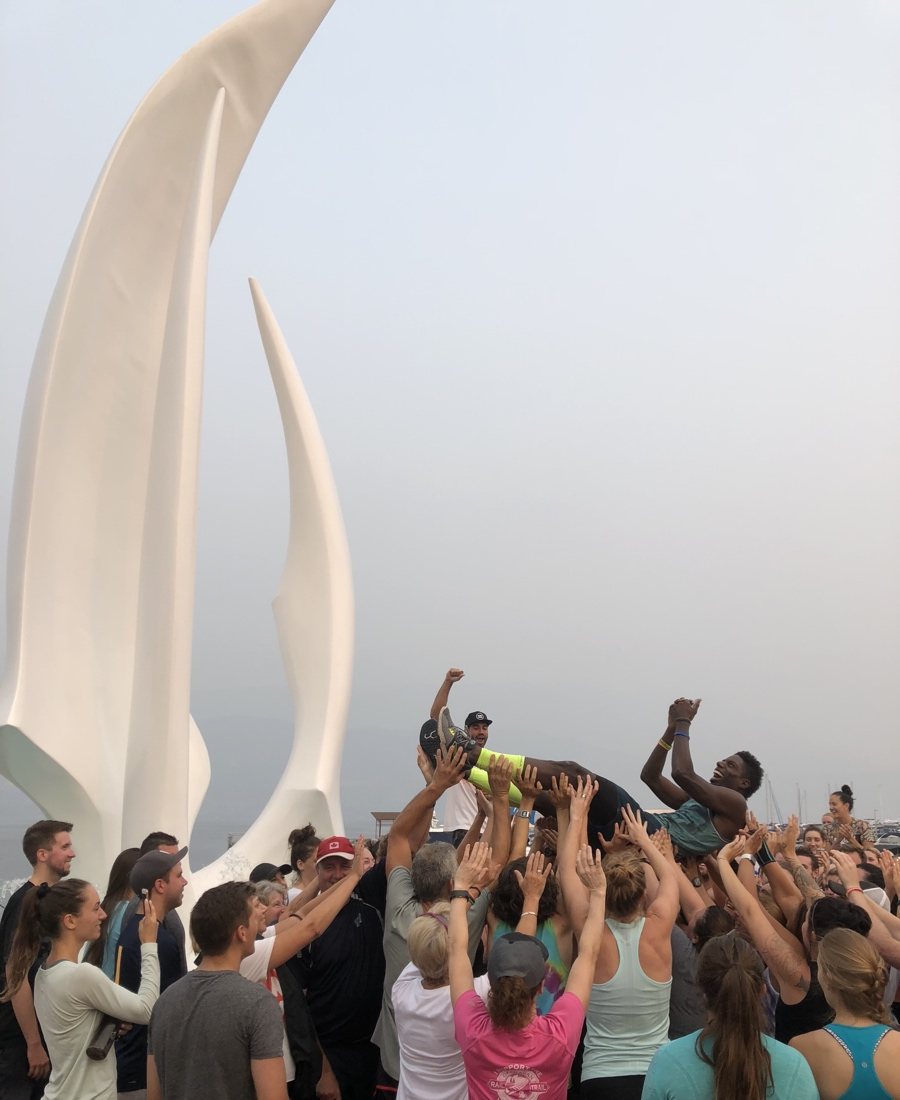
Crowd surfing with the November Project group in Kelowna, British Columbia. / Photograph courtesy of Vincent Goodwin
To piggyback on the desire to share my story and to not have it live in silence anymore, I did a lot of posting about it. I had a little blog and a newsletter. I was fundraising for the Leukemia & Lymphoma Society, and one day, Anthony, an employee at a company called Health Union, friend requested me on Facebook. I looked at it and clicked decline — I didn’t know who this person was or could possibly be. But then I went to my messages and saw one that hadn’t gone straight to my mailbox.
Anthony had sent me this long message introducing himself. He spoke about how Health Union was a parent company for different websites for different diseases. The goal was to recruit advocates for a website they were launching in the spring of 2018 called blood-cancer.com. He was interested in me either writing about my experiences or helping them develop and build their online community for moderation. It was a really cool thing to experience how putting yourself out there can almost create something for you.
In the beginning, I focused a lot on writing articles, but I noticed there were a lot of things that I just didn’t know. When I looked around at others posting, I didn’t feel like I had dug into things. I think that was because of when it happened in my life. At the time, I was 15, and my biggest concern was what I looked like and how cool I was or what people thought about me. I wasn’t thinking about sharing my story. I wasn’t thinking about what kind of chemotherapy I was on. I didn’t ask a whole lot of questions about my treatment.
So I decided to go down more the route of moderation. Whenever someone would write a piece, they would post it on their socials and create a conversation. As a moderator, I would be a part of that conversation by reading the articles and engaging with the comments. I think that one thing being part of blood-cancer.com and this community has done for me is shown the variety of experiences that we can have as people who’ve experienced blood cancer but also some of the commonalities as well. I’ve learned to put my story in perspective.
One great example of that is a lot of times when people heard that I had experienced cancer, I would get a lot of, ‘Oh, 15 years old, that’s an awful age to have cancer.’ For a while, I’d just nod my head, like yeah, sure, but one thing I’ve dug into in being a part of this community is the question of what does that mean. What is a good age to have cancer? What does having cancer at six look like versus someone who’s 30? It’s a challenge, no matter what point in your life it’s at. But I see articles about parents thinking about selling off their stuff ‘cuz they’re not sure they’re gonna live. Or how it can be a financial stressor and the debt that people can be put into. At 15 years old, I didn’t have to deal with any of that. My mom worked for Penn in billing, and she great benefits. But regardless of her benefits or not, I didn’t have to worry about a dime.
No matter who it’s affecting, there’s no good kind of cancer. There’s no good time to have it. We’re able to better crack that conversation or coach people to be more mindful in how they interact with people who’ve gone through this. That can be challenging to do as an individual. Having a community of people who understand how challenging it is to not be understood — I think that’s important in being able to put together a remedy for other people to support you that haven’t gone through that same experience.
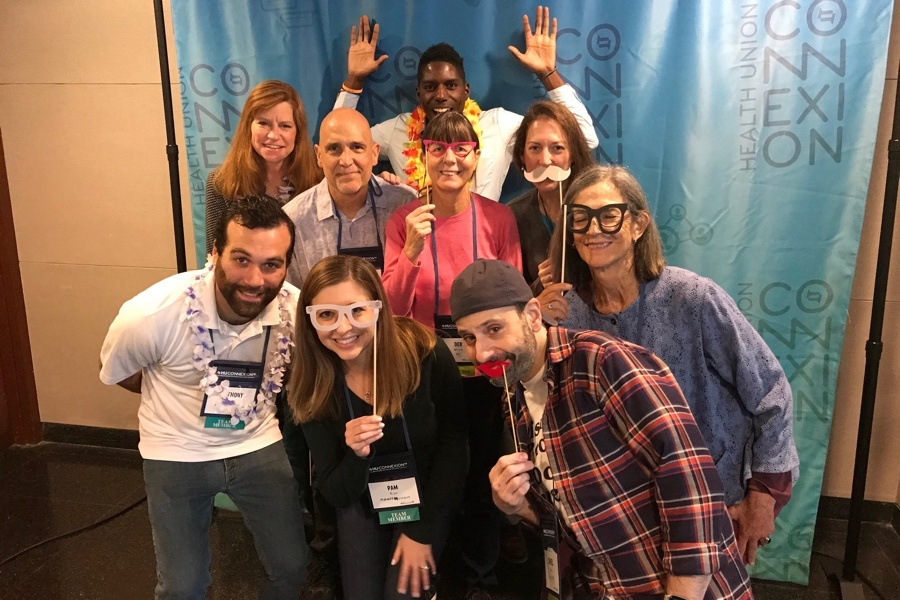
Goodwin with fellow Health Union writers at the recent Connexion conference. / Photograph courtesy of Vincent Goodwin
Recently Sierra began talking about projects we could work on together, and we came up with the idea to start a podcast around the topic of young adult cancer. While that was happening, I was also invited to speak at CHOP and then got recruited to be a mentor for a program to mentor cancer patients that they were developing.
I was getting so excited about everything that was presenting itself to me that I actually left my full-time job as the director of marketing for a home care agency about a month ago. I wanted to dive into creating this podcast, I wanted to be more of an active participant in the blood-cancer.com community, and I wanted to have space to be a mentor for CHOP. I didn’t want any of these things to be an aside. It’s been incredible and overwhelming to think about and talk about. I’m really leaning into advocacy, mentorship, collaboration, and just creation — creation of conversation and community and connection.
I’m grateful to be here and sharing my story — and not just looking back but also moving forward. I think you have to heal first in order to give back. And now I’m in a place where I can.”
